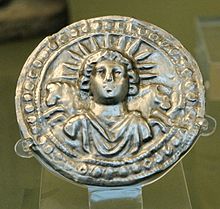A Time of Weakness, A Time of Strength: AD 315-450
Constantine’s Edict of Milan brought an end to the persecution of Christians, but that did not mean the Church was granted favor throughout the Roman Empire. What are the lessons for us today?
The impression is often left that with the Edict of Milan that Constantine issued in A.D. 313-314 which brought an end to the persecution of Christians, the Church was granted favor throughout the Roman Empire. Such was not the case. Constantine’s policy was only one of toleration. In A.D. 314, the coins that were issued throughout the empire during Constantine’s reign not only carried the image of the cross but also an emblem of Sol Invictus and Mars Conservator. These coins were issued year after year.

A third century silver disc of Sol Invictus (“Unconquered Sun”) that was the official sun god of the later Roman Empire. Image © Marie-Lan Nguyen / Wikimedia Commons.
The state of affairs was therefore of toleration and not of favoritism for a number of years. Persecution of Christians came to an end but there were still problems to be faced. The years between A.D. 313-4 and A.D. 475 were a period of stress and weakness but also a time of strengthening. The Roman pantheon remained and was honored chiefly by those in the military. There were military units that were also religious orders. Sol, the sun, was considered to be the God who brought about important victories. Other military units honored Mars. Various cavalries and infantries had their favorites.
Not only was there still the continuing presence of the Roman pantheon of Gods and heroes, but returning soldiers from the Eastern defense brought with them the cult of Mithra and its initiation rites. Because Rome had its eastern border along the Euphrates river with its main fortress, Dura Europas, facing the Persian city of Ctesiphon on the opposite bank, there was an opening for eastern ways to seep into the Roman empire. Gnosticism, a dualistic spirituality which considered the material world as evil and the spiritual world as good or divine, seeped through to the West as early as the late second century but gained ground through the third and fourth centuries. Gnosticism had a leech-like character and attached itself to anything that looked attractive. The Christian faith was one. As early as A.D. 185, Irenaeus, The bishop of Lyons in Gaul, attacked the Gnostics in his writing, Against Heresies. It was not enough though it helped to retard Gnostic spirituality.
Gnosticism and Mithraism were not the only ones to cross over into the Roman Empire. So did Manichaeism which was perpetrated by a Persian mystic named Mani who itinerated throughout the Persian realms and into parts of Roman East Africa, North Africa, and eastward to the Indus river valley. The man who saw through the errors of Mani was once attracted to his teachings, none other than Augustine. Soon after his conversion to Christ Jesus from a garden experience and the mentorship of Ambrose in Milan, Augustine attacked the teachings of Mani.
Augustine was important for the Church in more ways than his apologetic and polemic writings. One other contribution was the account of his way to Jesus, The Confessions, which had a wide reading within his own lifetime and which has been widely disseminated throughout the subsequent seventeen hundred years. Beyond the inspiration of the dramatic impact of the power of the grace of God in Christ Jesus, Augustine was the first to develop an understanding of the church as a counter-culture. This was done in his later writing De Civitate Deo (The City of God) composed at the time of the weakening of Rome in the West and when the Vandals and Visigoths invaded the western European sector of the empire. This is critical for the next issue of this writing.
Category: Church History, Winter 2014


